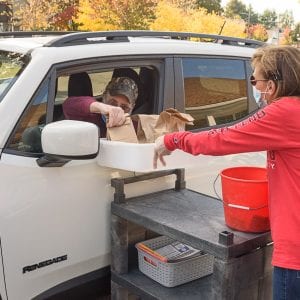By Tina Gorman,
Westfield Council on Aging executive director
Approximately half of home fire deaths occur between 11 p.m. and 7 a.m. when most people are sleeping. That’s a frightening statistic, but there is a simple fire safety strategy that costs nothing and could save your life. It’s time to add ‘Close Your Door’ to your fire safety checklist. Almost 60 percent of people sleep with their bedroom door open. But a closed door can slow the spread of flames, reduce toxic smoke, improve oxygen levels, decrease temperatures, and even save your life if you become trapped.

TINA GORMAN, Westfield Council on Aging executive director
In recent years, fires have become more dangerous than ever. The construction materials used in more modern homes, open floor plans, furniture made from synthetic fabrics, and the sheer volume of items that we possess, have created an ideal environment for fire disasters. These factors allow a fire to spread and become more toxic at an alarmingly fast rate, leading to less time for occupants to evacuate. In the past few decades, the average time to escape a home fire has gone from 17 minutes to just three minutes. Older adults with mobility, visual, hearing, and cognitive limitations are especially at risk of being trapped inside a burning home with very little time to escape.
The ‘Close Before You Doze’ campaign was started by the Firefighter Safety Research Institute (FSRI). More than a decade of research has shown that a simple behavioral change, closing the door, can have a potentially lifesaving impact during a fire. FSRI Director Stephen Kerber advises people to, “sleep with the bedroom door closed.” Doing so can reduce the room heat temperature 900 degrees, from 1,000 degrees to 100 degrees. During a fire, a closed door can also keep carbon monoxide levels down.
A fire requires oxygen to burn. A closed door keeps more oxygen in the room and away from the fire. Opening doors and windows in the area of the fire to “let the smoke out” also allows more air to come in, exacerbating the problem. With the doors and windows closed, the fire won’t have oxygen to burn and that will prevent the fire from spreading.
Westfield Deputy Fire Chief Eric Bishop reminds older adults that smoke detectors are the key to survival as early detection will allow more time to get out of a burning building. Having an escape plan that you have practiced in advance is important. If you have a cell phone, keep it close to your bed at night and make sure that it is fully charged. During a fire emergency, do not take the time to look for pets. They will likely escape on their own. And it is vital to remember that extinguishing a fire requires professional expertise. Do not attempt to fight a fire yourself. Get out of the building, closing doors as you leave, and call 9-1-1.
If you get trapped inside your bedroom, do not panic. Assess the situation. Keep the door closed. If there is a phone in the room, call 9-1-1, tell the dispatcher that you are trapped, and stay on the phone with dispatch. If possible, stay close to the floor where the air is fresher.
Smoke will rise, even if it’s seeping into a closed room. If there is a master bathroom attached, fill the tub with cold water. Soak towels with the water and use them to block the ventilation duct and the space under the door. If the room is smoky, clear it with the bathroom exhaust fan and protect your lungs. Breathe through a wet towel that covers your nose and mouth. Breathe only through your nose. Grip part of the towel with your lips and teeth to remind you not to breathe through your mouth.
A closed door can slow the spread of fire, reduce toxic smoke levels, improve oxygen levels, decrease temperatures dramatically, and keep you safe until help arrives. That may be the difference between life and death, especially for older adults.







